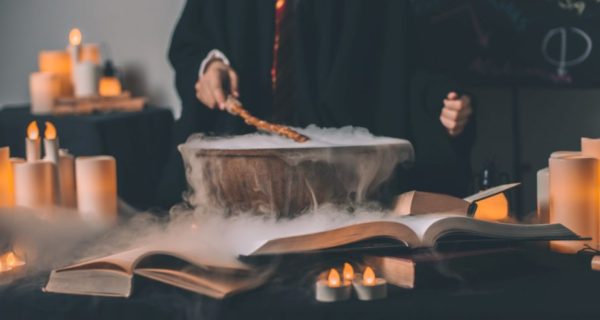Harry Potter was, is and will continue to be controversial as reading material for children. The greatest reason is because the young protagonists are witches and wizards, though there are other concerns such as how our trio continually ignores the rules and seems to know better than the adults, and yet always manages to come out on top, nearly unscathed, and certainly unpunished every time.
Magic in the hands of young protagonists makes many adults uncomfortable, though these seem far from a majority. This is not surprising when once considers that, historically, most wizards and witches have been evil (consider the weird sisters in MacBeth and the witch hunts throughout the centuries), though there have been ‘good’ witches and wizards, such as Merlin, followed much later by Gandalf of Tolkien’s Lord of the Rings and Glinda the Good Witch of L. Frank Baum’s Wizard of Oz. Both Gandalf and Glinda have evil counterparts, however, in Sauron and Saruman, the Wicked Witch of the East and the Wicked Witch of the West.
But why are wizards and witches looked on with suspicion, anyway? Are we not simply prejudiced against them? I think not. I believe in the existence of true, dark magic that can be addictive and take some control over one’s life. When as a teenager I asked my mom if she would lift her ban on Potter in the house, she told me to research it for myself and make my own decision. I did, and while I sadly cannot recall my sources, I was intrigued by what I found. There were articles about the disobedient Harry coming out on top, pointing out that it encourages childhood disobedience. There were blog posts about people joining magical cults, rarely with full knowledge and understanding, who felt a dark presence, fear and loss of control in their own lives until they managed to leave their respective cults – stories of real, terrible, dark magic hidden from the world that laughs at it as a fairytale.
If we concede that there may be real, black and terrible magic in the world, what does this have to do with Hogwarts? Simply put, there is a fear that any fictional magic is a reference to the real, scary magic, and that fantastical magic could lead people to the real thing. While this may seem like a stretch, there may be some truth behind it, as people may become interested in fantasy magic, then bridge into slight-of-hand magic, and finally discover real, dark magic. Is this likely? I would say no, it is not likely, but it is possible.
Let’s say you agree with me that fantasy magic could act as a gateway to real, dark magic. How do we prevent this? Some people keep magic out of their books and homes to the best of their ability. However, to be strict about it, you would miss out on literature such as Lord of the Rings, The Chronicles of Narnia, and all Arthurian tales and fairytales, not to mention The Magic School Bus. Other people stress the difference between fact and fantasy, claiming magic as entirely fictional. But pretending something isn’t real does not do a good job of protecting people from it.
While I was doing my research, I stumbled across a well-written article arguing that magic in the hands of venerated elders such as Gandalf, fairy godmothers and Aslan is harmless, as it comes from a higher power and disallows the average person to wield it, potentially protecting people from following the path to real, dark magic. On the other hand, explained spells and magic in the hands of a younger protagonist should be avoided, according to the same article. This would eliminate books such as Harry Potter, the Eragon series, M.L. Forman’s Adventurers Wanted, and many more that may otherwise be called acceptable.
As for me, I find myself agreeing with that article with regards to younger, more impressionable children, though I’m more inclined to open up the world of young magical protagonists to more grounded and responsible teens. Harry Potter I would especially not give to young children, preferring to wait until they are more mature so the disobedience and every-growing darkness in the series would affect them less. What do you think?
